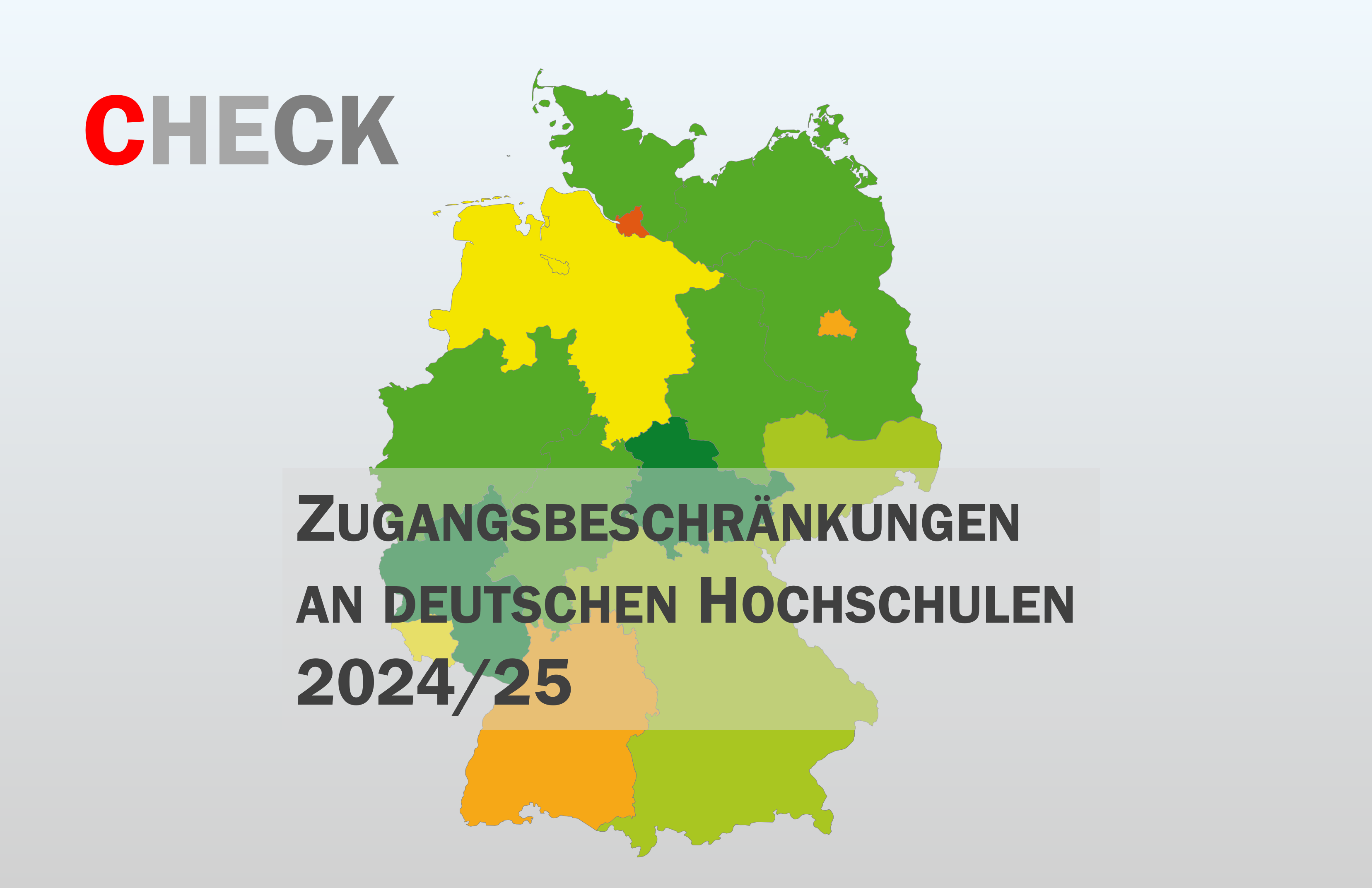
Many students will be receiving their school-leaving certificates again these days. Most degree programmes in Germany will then be completely open to them. Only 35 per cent of all degree programmes will still have admission restrictions in the coming winter semester. This can either be a quantitative admission restriction, a so-called numerus clausus, or a qualitative restriction via an aptitude assessment procedure. In both cases, admission is decided on the basis of grades or other criteria such as test results, selection interviews or previous professional experience. Hamburg, Berlin and Baden-Württemberg have the highest proportion of restricted admission degree programmes. This is the result of the annual evaluation by the CHE Centre for Higher Education Development.
The proportion of degree programmes with restricted admission has fallen further
In the coming winter semester 2024/25, Hamburg, Berlin and Baden-Württemberg will be the three federal states in which more than half of the degree programmes on offer will still be restricted. With a rate of 62.4 per cent, Hamburg has the highest proportion in a state comparison. It is followed by Berlin and Baden-Württemberg with 55.3 and 54.2 per cent respectively.
Rhineland-Palatinate and Thuringia have the best chances of gaining a place on a degree programme. Here, not even one in five degree programmes has a numerus clausus or aptitude test. Across Germany, the proportion of degree programmes with restricted admission has fallen further to 35.2 percent. This corresponds to a decrease of 2.7 percentage points compared to the winter semester 2023/24.
The chances of finding a place on a medical degree programme have also increased for applicants
‘We have been observing a decline in the number of restricted study programmes in Germany for years. This is largely due to the decline in the number of first-semester students and the simultaneous expansion of study programmes,’ explains Director of Studies Cort-Denis Hachmeister.
‘The prospects for prospective students to gain a place on their chosen degree programme are currently better than ever before. Even in subjects with nationwide admission restrictions, such as medicine, the ratio of study places to applicants has improved significantly in recent years,’ says the expert for university admissions at CHE. On average, there are 2.8 applicants for each study place in the centralised application procedure for pharmacy, human medicine, veterinary medicine or dentistry.
There are clear differences in the comparison of university cities
The comparison of cities continues to show quite clear differences. Applicants in Aachen have the best chance of finding a place to study in a university city with more than 50,000 students. In this year’s evaluation by the CHE, the rate of restricted study programmes is 18 per cent. Erfurt and Paderborn have the lowest rates among cities with more than 20,000 students, with a rate of 4 per cent each. Garching (77%), Leipzig (54%) and Karlsruhe (53%) have the highest rates of all university cities with more than 16,000 students.
The nationwide trend is also evident in the metropolises and popular university cities. In cities such as Hamburg, Berlin, Cologne, Bremen and Göttingen, the proportion of restricted study programmes has fallen, in some cases significantly, compared to the previous year.
CHE expert Cort-Denis Hachmeister advises that it is always worth considering universities further afield or outside the federal state borders when looking for a place to study. ‘There are often equivalent courses on offer without numerus clausus or aptitude assessment procedures, even at neighbouring universities,’ says Hachmeister.
Best chances of finding a free place on a degree programme in linguistics and cultural studies
The quota varies greatly depending on the subject, type of university and type of degree: in law, economics, social sciences and social sciences, 41.6 per cent of all degree courses nationwide are restricted. In linguistics and cultural studies, on the other hand, around four-fifths of programmes are open to all first-year students regardless of their A-level grades or other aptitude criteria.
A lower proportion of degree programmes at universities (32.6 percent) are subject to restrictions than those at universities of applied sciences (34.1 percent). At 34.1 per cent, Bachelor’s degree programmes have a slightly lower figure than Master’s degree programmes (36.3 per cent).
About the publication:
The ‘CHECK – Admission Restrictions at German Universities 2024/25’ is based on data from the Higher Education Compass of the German Rectors’ Conference for around 22,000 degree programmes in the winter semester 2024/25 as well as corresponding data from previous years. Locally and nationally restricted admission programmes as well as programmes for which a selection procedure or aptitude test takes place are counted as restricted admission programmes. The state quotas were determined in relation to the university’s main location. In the case of location-based quotas, all degree programmes offered at the place of study are counted. As a result, there may be minor deviations between the state and location quotas for city states. The federal state, type of higher education institution, type of degree and subject group served as analysis criteria for the team of authors Cort-Denis Hachmeister and Anna Gehlke.
